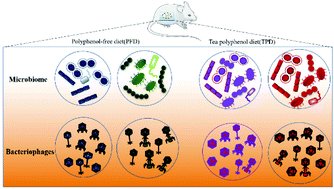Correlation between the regulation of intestinal bacteriophages by green tea polyphenols and the flora diversity in SPF mice†
Abstract
Green tea polyphenols (GTP) play an important role in shaping the gut microbiome, comprising a range of densely colonizing microorganisms, including bacteriophages. Previous studies focused on the effect of GTP on the bacteria in the gut microbiota. However, little is known about the role of GTP in the bacteriophage composition of healthy intestines. In this study, SPF male C57BL/6J mice were divided into a polyphenol-free diet group and a tea polyphenol diet group where drinking water was supplemented with 0.1% GTP for 28 days. The ultra-deep metagenomic sequencing of virus-like particle preparations and bacterial 16S rRNA sequencing were performed on mouse stool samples. Changes in the gut bacteriome, bacteriophages, and bacterial–bacteriophage correlations were then compared between the groups. The results revealed an abundance of Firmicutes, a significant decrease in Bacteroidetes, and a significant increase in the ratio of F/B after GTP exposure. The GTP altered the abundance (relative abundance > 1.00%) of Bifidobacterium (regulation rate of 89.78% and the abundance up-regulated by 0.89%) and Akkermansia (regulation rate of 99.70% and the abundance down-regulated by 1.77%). The abundance of Faecalibaculum (regulation rate of 60.17%) increased by 24.38% following GTP treatment. The GTP also altered the abundance of Salmonella phage (regulation rate of 98.64% and the abundance up-regulated by 3.16%) and that of Gordonia_phage_Yakult (regulation rate of 99.99% and the abundance down-regulated by 5.44%). It significantly increased the intestine's lytic phages and reduced the temperate phages by 29.22%. The dominant microorganisms (relative abundance >1.00%) of Bifidobacterium and Dubosiella had a significantly negative relationship with the Faecalibacterium phage and a significantly positive relationship with the Lactobacillus prophage. Exposure to GTP positively promoted changes in the gut bacteriophage community and interaction network in the microbial community of the SPF mice. These findings highlight the importance of “profitable” bacteriophage–bacteria relationships and reveal a potential mechanism of GTP towards the regulation of intestinal flora via intestinal phage communities.

- This article is part of the themed collection: Food & Function HOT Articles 2022


 Please wait while we load your content...
Please wait while we load your content...